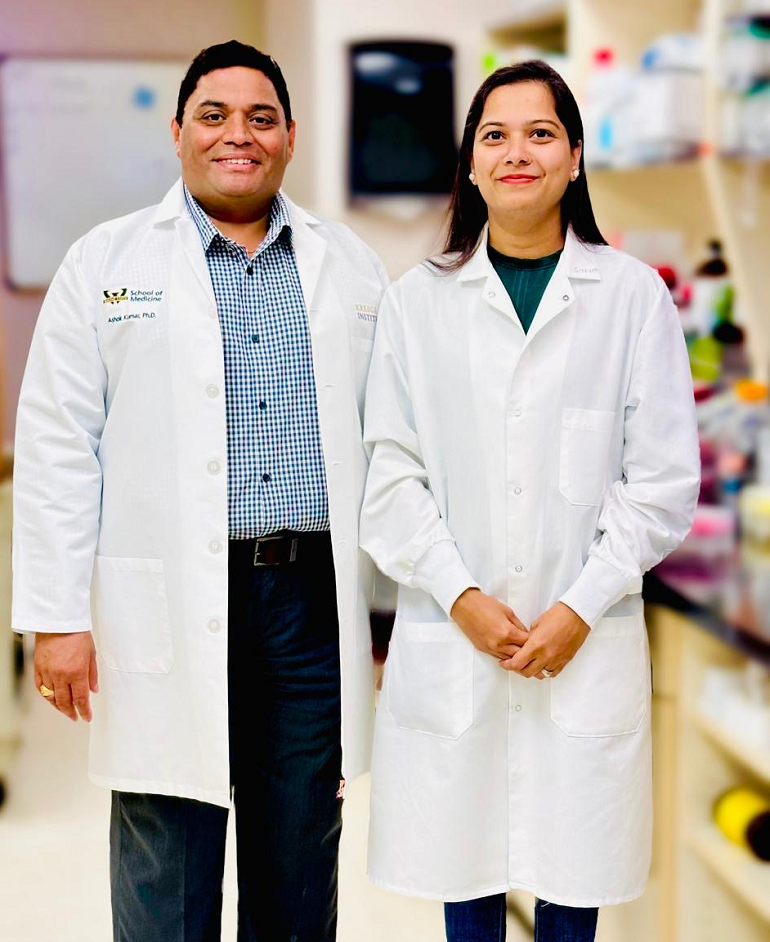Wayne State University School of Medicine postdoctoral fellow Sneha Singh, Ph.D., has been awarded the K99/R00 Pathway to Independence Award by the National Eye Institute of the National Institutes of Health to support her transition from a mentee to an independent researcher, with the ultimate goal of securing a tenure-track faculty position.

“Pathway to Independence Awards from the National Institutes of Health assists postdoctoral fellows to transition from fellowship status to tenure-track faculty positions in the biomedical sciences,” said Ezemenari M. Obasi, Ph.D., vice president for research and innovation at Wayne State University. “Receiving these awards demonstrates that the candidate has already begun to develop a track record of successfully receiving extramural funding which can be an important indicator of future success. This award to Dr. Singh is most deserving.”
Dr. Singh works in the laboratory of Ashok Kumar, Ph.D., professor of Ophthalmology, Visual, and Anatomical Sciences. The award, totaling $1,085,775, will support her research into ocular viral infections, with a focus on the Zika virus.
The grant, “Mechanisms regulating breach of blood-retinal barrier upon Zika virus infection,” will investigate how the Zika virus enters the eye and causes ocular pathology. Dr. Singh’s long-term goal is to study the pathogenesis of flaviviruses, such as Zika and Dengue, and identify potential therapeutic targets.
During the K99 phase of the grant, she will work to establish a congenital Zika virus infection model in an immunocompetent animal model, and to develop retinal organoids using induced pluripotent stem cells.
She will be co-mentored by Vaithilingaraja Arumugaswami, D.V.M., Ph.D., of the University of California, Los Angeles, with additional guidance from an advisory committee that includes Gil Mor, M.D., Ph.D., of the C.S. Mott Center for Human Growth and Development; Shailendra Giri, Ph.D., of Henry Ford Health; and Deepak Shukla, Ph.D., of the University of Illinois, Chicago.
Dr. Singh joined Dr. Kumar’s lab in 2018 to investigate the pathogenesis of ocular Zika virus infection. She earned her doctorate in virology from the Rajiv Gandhi Center for Biotechnology at the University of Kerala, where she studied Dengue virus-induced vascular leakage under the guidance of Easwaran Sreekumar, MVSc, Ph.D.
“I have a long-standing interest in RNA viruses like Zika, Dengue, Chikungunya, West Nile virus and SARS-CoV-2,” Dr. Singh said. “Since the 2015-2016 epidemic in Brazil, Zika virus infection has been linked to microcephaly in newborns, with one-third of these infants reported to have ocular anomalies. Despite this, the ocular pathology of the Zika virus remains poorly understood, and no treatments are currently available. Dr. Kumar’s lab is one of the few worldwide studying the impact of these RNA viruses on vision, which drew me to join his team.”
The K99/R00 is one of the few available for non-U.S. citizens, designed to support outstanding postdoctoral researchers who are transitioning to independent faculty positions.
“This significant achievement marks a major milestone in Sneha’s research career and underscores her exceptional contributions to the field of vision science,” Dr. Kumar said. “She has all the key elements to be successful in her academic research career. Sneha is the second postdoctoral trainee from my lab to be an independent investigator.” (The first, Pawan Singh, Ph.D., received an R01 while working in Dr. Kumar’s lab in 2021, and is now on the faculty at the University of Missouri at Columbia).
The grant represents the culmination of an idea she has been developing for five years.
“It was an emotional journey with many challenges along the way, so getting it funded in the first attempt is remarkable,” Dr. Singh said. “Throughout this entire process, I’ve been deeply grateful for my mentors and advisors, who not only dedicated significant time to guiding me but also provided unwavering support throughout the grant journey.”
Dr. Singh called her experience at the Wayne State University School of Medicine “truly unique and rewarding.”
“When I joined Dr. Kumar’s lab in 2018, it was clear how much he invests in his team and its members. I owe my deepest thanks to Dr. Kumar, whose encouragement, mentorship and consistent support enabled me to pursue independent research. He embodies the ideal mentor, and I hope to one day pay it forward by mentoring future doctoral students and postdocs,” she said.
Mark Juzych, M.D., chair of the Department of Ophthalmology, Visual and Anatomical Sciences, commended Dr. Singh and Dr. Kumar on securing the competitive grant.
“Sneha’s success highlights the importance of our Kresge Eye Institute Translational and Innovative Research Grant program, which supported her earlier work. Dr. Kumar’s mentorship has been instrumental in shaping the next generation of vision researchers, and we are proud of both of their accomplishments,” he said.
The grant number for the National Institutes of Health study is K99EY036452.